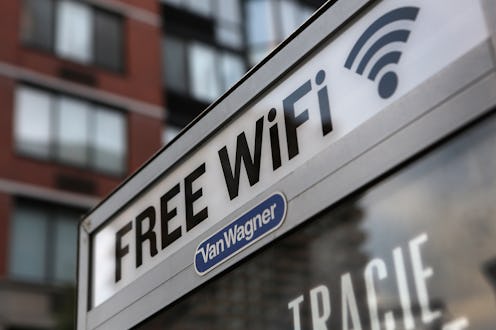Life
Here’s Why Your Internet Seems Super Slow When It’s Gross Out

In my neck of the woods, it's a running joke that in the fresh air after a heavy snowfall, Wi-Fi and phone data signals are mysteriously strong and quick. Whether this is actually true or just driven by a desperate need to find a positive note during winters with five-foot snowfalls and constant below-zero temperatures is a toss-up, but either way, it begs a question: Can the weather actually affect our Wi-Fi speeds, or is there something else going on that makes the internet seem to slow down when the weather is less than agreeable?
The answer is pretty murky. On its website, Apple offers a comprehensive list of things that can affect Wi-Fi and Bluetooth signals, including microwaves, power lines, some types of cordless phones, and wireless speakers... but not including the weather. Speed test site Bandwidth Place says, "Does weather affect Internet speed? Absolutely. Damage to power, phone, or cable lines can impact your connection, while a high number of concurrent users — perhaps trying to check the weather report — may slow it to a crawl." Not to mention all those folks who cuddle up in bed downloading new ebooks or queuing up a good ol' Netflix binge to pass the time during a nasty thunderstorm.
But physical damage to Wi-Fi conduits and an overflow of users are offshoot causes of weather-related Wi-Fi problems. As for whether inclement weather (see what I did there) can itself somehow wiggle into your Wi-Fi signal and screw it up, that appears to be up for debate. Review site Techwalla asserts that rain does have an effect on Wi-Fi signals, "particularly for wireless setups using the 2.4-GHz radio frequency."
The site explains, "Water droplets absorb this radio frequency and partially block the signal. Anecdotal evidence from communities with light-pole-based public Wi-Fi suggest[s] that rainy days had an impact on signal strength." But despite this, Techwalla says, most Wi-Fi signals "are short range and usually deployed indoors," so though rain could interfere with a Wi-Fi signal, if your router is inside your house (and so are you), it's not likely going to cause a problem for your devices, since indoor Wi-Fi is "largely immune to weather effects," the site explains.
However, Techwalla also points out that distance from your router is "a much likelier culprit for low signal strength." That may not sound like new information, but consider this: We tend to like to curl up and be cozy on rainy or snowy days, and for many of us, that means retreating to our bedroom to snuggle in. If you usually spend your days in the living room, right next to your router, but on a bad weather day spend your time upstairs in bed, a full floor away from the router, that's going to make your internet slower. And if your internet always seems slow on days with nasty weather, it's super easy to assume the slow internet is because of the weather, instead of because you've shifted locales.
Rain and snow aren't the only types of inclement weather to consider, however. Techwalla also mentions high temperatures, but clarifies that "Wi-Fi signals themselves ignore temperature in a given enviroment." The site notes that "there's a great deal of anecdotal evidence that community Wi-Fi services work less well on hot days, when the temperature exceeds 90 degrees Fahrenheit, the explanation has less to do with the signal strength and more to do with equipment overheating."
According to Techwalla, users may not see as much Wi-Fi speed interference in the winter because outdoor Wi-Fi equipment can be heated to protect it from the cold, but "it's not feasible to cool an outdoor Wi-Fi system in the summer," which is why folks may see slowdowns due to overly hot equipment.
A few of the issues mentioned here have easy fixes. If you've experienced slow Wi-Fi on bad weather days, do a little Mythbusters-ing and scope out whether or not you tend to move away from your router. Check out Apple's list of potential interferences and clear them out. And, of course, if you think your Wi-Fi is simply being overloaded by other folks stranded inside, hiding from the gross weather, it may be time to find a comfy place to hang out with a book until the information superhighway is a little less crowded.